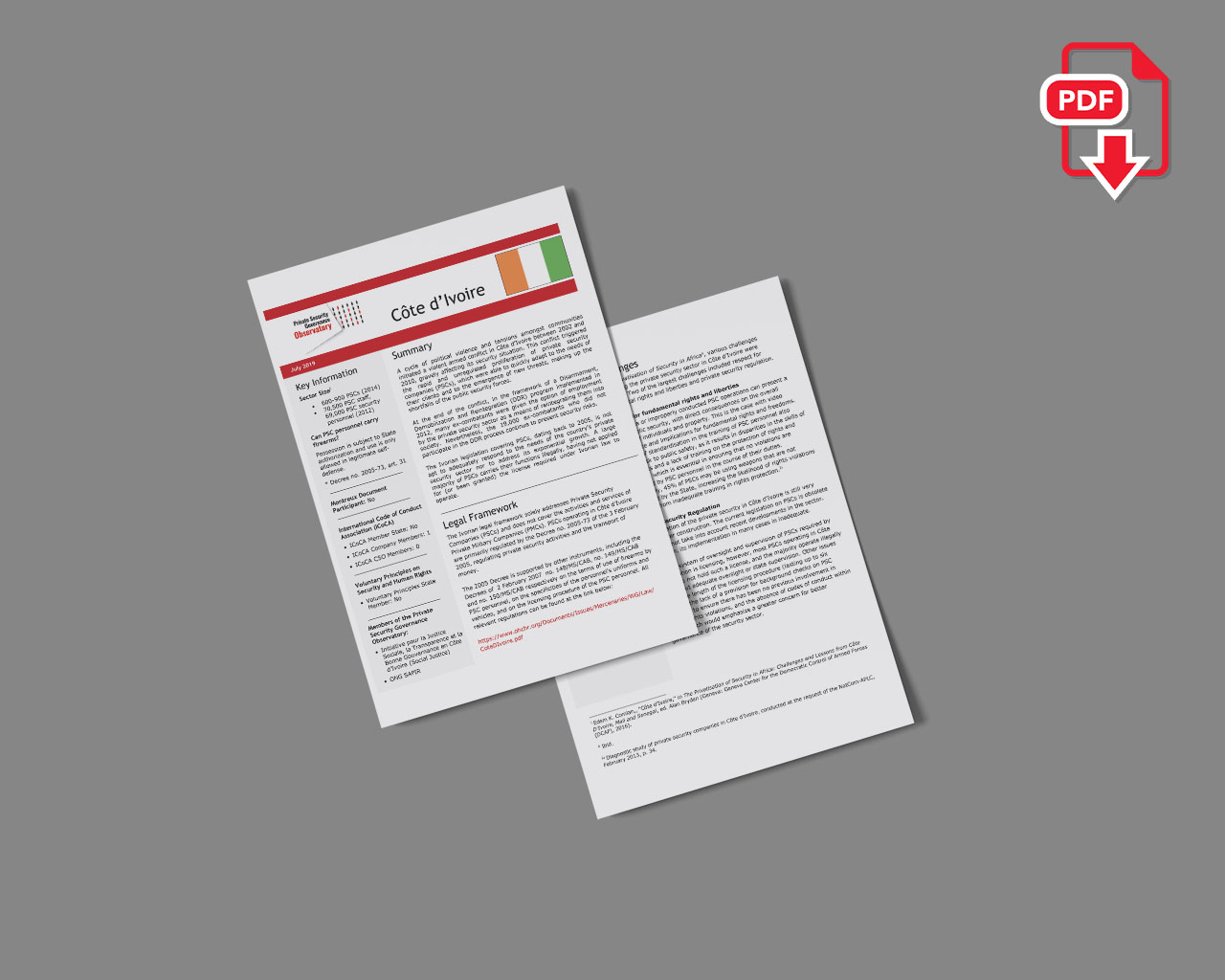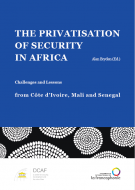Réglementation et Surveillance
Un référentiel d’informations aux niveaux national, régional et international
Côte d'Ivoire
Since 2002, the private security sector in Ivory coast has become a major industry, undertaking an important role for the provision of security in the country. The latest available information indicates that 400 private security companies are operating in the country, counting around 70’500 staff.
Main law regulating private security: DECREE NO.2005-73
Key Information |
|
Côte d'Ivoire is not a participant to the Montreux Document. |
|
Sector Size[i]
|
Can PSC personnel carry firearms?
|
International Code of Conduct Association (ICoCA)
|
Voluntary Principles on Security and Human Rights
|
Summary
A cycle of political violence and tensions amongst communities initiated a violent armed conflict in Côte d’Ivoire between 2002 and 2010, gravely affecting its security situation. This conflict triggered the rapid and unregulated proliferation of private security companies (PSCs), which were able to quickly adapt to the needs of their clients and to the emergence of new threats, making up the shortfalls of the public security forces.
At the end of the conflict, in the framework of a Disarmament, Demobilization and Reintegration (DDR) program implemented in 2012, many ex-combatants were given the option of employment by the private security sector as a means of reintegrating them into society. Nevertheless, the 19,000 ex-combatants who did not participate in the DDR process continue to present security risks.
The Ivorian legislation covering PSCs, dating back to 2005, is not apt to adequately respond to the needs of the country’s private security sector nor to address its exponential growth. A large majority of PSCs carries their functions illegally, having not applied for (or been granted) the license required under Ivorian law to operate.
Legal Framework
The Ivorian legal framework solely addresses Private Security Companies (PSCs) and does not cover the activities and services of Private Military Companies (PMCs). PSCs operating in Côte d’Ivoire are primarily regulated by the Decree no. 2005-73 of the 3 February 2005, regulating private security activities and the transport of money.
The 2005 Decree is supported by other instruments, including the Decrees of 2 February 2007 no. 148/MS/CAB, no. 149/MS/CAB and no. 150/MS/CAB respectively on the terms of use of firearms by PSC personnel, on the specificities of the personnel’s uniforms and vehicles, and on the licensing procedure of the PSC personnel. All relevant regulations can be found (in French) at the link below:
Textes regissant les enterprises privées de sécurité et de transport de fonds en Côte d'Ivoire
Challenges
In The Privatisation of Security in Africa[ii], various challenges confronting the private security sector in Côte d’Ivoire were identified. Two of the largest challenges included respect for fundamental rights and liberties and private security regulation.
Respect for Fundamental Rights and Liberties
Inadequate or improperly conducted PSC operations can present a risk to public security, with direct consequences on the overall security of individuals and property. This is the case with video surveillance and implications for fundamental rights and freedoms. The lack of standardisation in the training of PSC personnel also poses a risk to public safety, as it results in disparities in the skills of PSC agents and a lack of training on the protection of rights and freedoms, which is essential in ensuring that no violations are committed by PSC personnel in the course of their duties. Additionally, 45% of PSCs may be using weapons that are not authorized by the State, increasing the likelihood of rights violations resulting from inadequate training in rights protection.[iii]
Private Security Regulation
The regulation of the private security in Côte d’Ivoire is still very much under construction. The current legislation on PSCs is obsolete and does not take into account recent developments in the sector. In addition, its implementation in many cases in inadequate.
The main system of oversight and supervision of PSCs required by the legislation is licensing, however, most PSCs operating in Côte d’Ivoire do not hold such a license, and the majority operate illegally and without adequate oversight or state supervision. Other issues include the length of the licensing procedure (lasting up to six months), the lack of a provision for background checks on PSC personnel to ensure there has been no previous involvement in human rights violations, and the absence of codes of conduct within PSCs, which would emphasize a greater concern for better governance of the security sector.
Members of the Private Security Governance Observatory
- Initiative pour la Justice Sociale, la Transparence et la Bonne Gouvernance en Côte d’Ivoire (Social Justice)
- ONG SAPIR
[i] Edem K. Comlan,, "Côte d’Ivoire," in The Privatisation of Security in Africa: Challenges and Lessons from Côte D'Ivoire, Mali and Senegal, ed. Alan Bryden (Geneva: Geneva Center for the Democratic Control of Armed Forces (DCAF), 2016).
[ii] Ibid.
[iii] Diagnostic study of private security companies in Côte d’Ivoire, conducted at the request of the NatCom-APLC, February 2013, p. 34.


